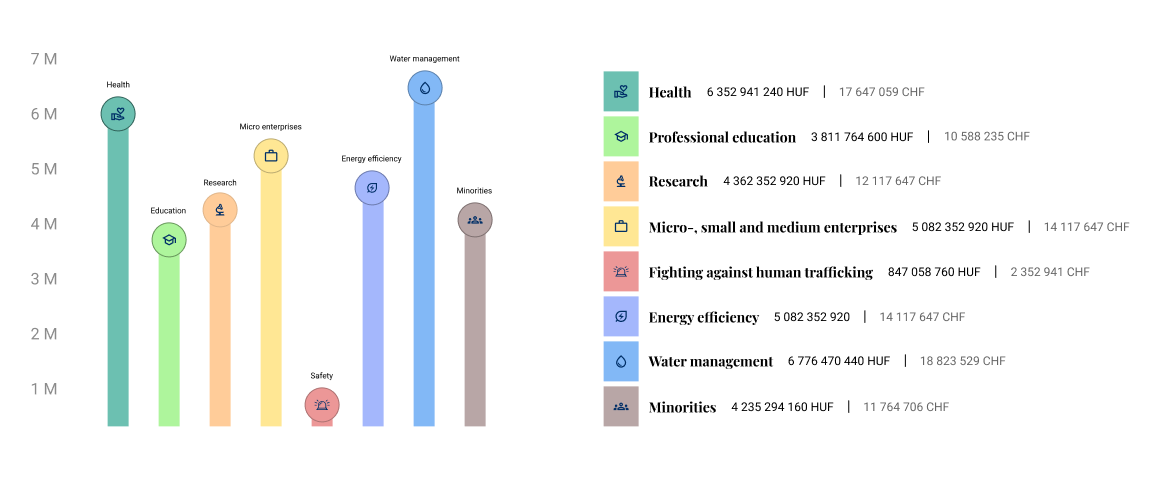ABOUT THE COOPERATION PROGRAMME
The National Coordination Unit (NCU) is responsible for the domestic planning, coordination and implementation of the Swiss-Hungarian Cooperation Programme, ie the Swiss Fund. The tasks of the National Coordination Unit within the National Development Centre are performed by the Deputy State Secretariat for the Coordination of EU Development.
In this area of responsibility, the NCU develops the domestic regulatory system of the cooperation programme, participates in the development of the system of implementing institutions and ensures its proper operation.
It is in direct contact with the Swiss authorities and the Swiss Contribution Office in Budapest and is directly responsible for the implementation of developments in certain thematic areas. These areas are:
- Financing for micro, small and medium-sized enterprises;
- Providing support to migration management and promoting integration measures;
- Water and wastewater management;
- Energy efficiency and renewable energy;
- Life saving skills development (project)
More information about the institutions participating in the implementation can be found in About Us / Organizational structure in part.
Current information about the Swiss Fund is available on this website.
For general information about the Swiss Fund, please contact svajcialap@nfk.gov.hu.
For each thematic area - e.g. application opportunities, contact - in case of interest, the information can be found in the Programmes & Projects section of the website.
Our story
The history of the Swiss Contribution in Hungary is closely linked to our EU membership. For the last countries to join the European Union, the Swiss Confederation has already provided resources in two stages to reduce economic and social disparities in a spirit of solidarity.
I. OBJECTIVES
The Swiss Contribution is a support scheme set up by the Swiss Confederation by which the Swiss party wishes to contribute to the costs of enlarging the European Union after 2004 in the spirit of solidarity. Although the Swiss Confederation is not a member of the European Union and therefore does not contribute to the common policies of the European Union, this special support programme helps to reduce disparities between the countries of the European Union, which is a form of compensation for its participation in the internal market.
So the Swiss Contribution is intended to reduce economic and social disparities between the enlarged European Union and the regions with different levels of development of the beneficiary countries; at the same time to build and further strengthen bilateral relations between the beneficiary countries and the Swiss Confederation.
The beneficiary countries of the Swiss Contribution are the Member States that have joined the European Union since 2004, including Hungary.
II. FINANCING
The Swiss Confederation enters into a bilateral agreement with each beneficiary country setting out the general institutional, financial and procedural conditions for the provision of assistance, which is the so-called Framework Agreement. This agreement establishes the Swiss-Hungarian Cooperation Programme, i.e. the Swiss Fund within the framework of the Swiss Contribution.
In the current second funding period, the total amount of support to be granted by the Swiss side for a period of 10 years is approximately CHF 1.3 billion. Hungary's share from this framework is CHF 87.60 million. Hungary also contributes to this amount, so together with the national co-financing, there is an opportunity to use more than 103 million Swiss francs.
The opportunity to implement projects and programmes for identified purposes is provided until the 3rd of December 2029.
III. SUPPORTED AREAS
In order to meet the overall objectives mentioned above - namely to reduce economic and social inequalities - the Swiss side has set five purposes, which are the following:
- promoting economic growth and social dialogue, reducing (youth) unemployment
- managing migration and supporting integration, increasing public safety and security
- protecting the environment and the climate
- strengthening of social systems
- promoting civic engagement and transparency
Within these five purposes, additional so-called thematic areas have been identified. From these, the beneficiary states, in cooperation with the Swiss side, select the areas in which to use the support, taking into account efforts to strengthen bilateral relations.
The Swiss Fund, taking into consideration domestic development needs and priorities, supports the following areas in Hungary:
vocational and professional education and training;
- research and innovation;
- financing for micro, small and medium-sized enterprises;
- providing support to migration management and promoting integration measures;
- energy efficiency and renewable energy;
- water and wastewater management;
- health and social protection;
- minorities and socially disadvantaged groups
In view of all the above, various developments will be implemented in Hungary in eight thematic areas. In some thematic areas, developments will serve programme purposes, while in other areas projects will be implemented. The different approach is the most important difference in the role of the institutions involved in implementation, there will be no significant difference in the procedures for the beneficiaries.
The collective term for developments under the Swiss Fund, whether for programme purposes or for project implementation, is a support measure.
